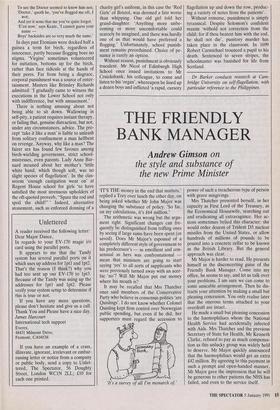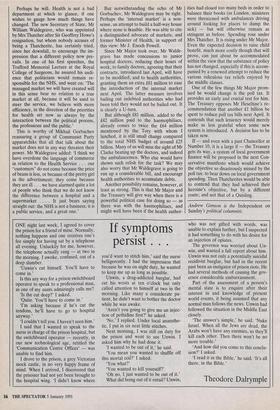THE FRIENDLY BANK MANAGER
Andrew Gimson on
the style and substance of the new Prime Minister
`IT'S THE money in the end that matters,' replied a Tory over lunch the other day, on being asked whether Mr John Major was changing the substance of policy. 'So far, on my calculations, it's £64 million.'
The arithmetic was wrong but the argu- ment right. Significant changes can fre- quently be distinguished from trifling ones by seeing if large sums have been spent (or saved). Does Mr Major's espousal of a completely different style of government to his predecessor's — as emollient and con- sensual as hers was confrontational mean that ministers are going to start saying 'yes' to all sorts of supplicants who were previously turned away with an acer- bic 'no'? Will Mr Major put our money where his mouth is?
It may be recalled that Mrs Thatcher once said members of the Conservative Party who believe in consensus politics 'are Quislings'. I do not know whether Colonel Quisling kept firm control over Norwegian public spending, but even if he did, her supporters must regard the accession to 'It's a survey of all I'm monarch o power of such a treacherous type of person with grave misgivings.
Mrs Thatcher presented herself, in her capacity as First Lord of the Treasury, as the Economical Housewife, searching out and eradicating all extravagance. Her ac- tions sometimes belied this character: she would order dozens of Trident D5 nuclear missiles from the United States, or allow hundreds of millions of pounds to be poured into a concrete cellar to be known as the British Library. But the general approach was clear.
Mr Major is harder to read. He presents himself in the disconcerting guise of the Friendly Bank Manager. Come into my office, he seems to say, and let us talk over your problems. I am sure we can come to some amicable arrangement. Then he dis- tracts your attention by making a small but pleasing concession. You only realise later that the onerous terms attached to your overdraft are intact.
He made a small but pleasing concession to the haemophiliacs whom the National Health Service had accidentally infected with Aids. Mrs Thatcher and the previous Secretary of State for Health, Mr Kenneth Clarke, refused to pay as much compensa- tion as this unlucky group was widely held to deserve. Mr Major quickly announced that the haemophiliacs would get an extra £42 million. By agreeing to this payment in such a prompt and open-handed manner, Mr Major gave the impression that he will be generous to other patients the NHS has failed, and even to the service itself. Perhaps he will. Health is not a bad department at which to glance, if one wishes to gauge how much things have changed. The new Secretary of State, Mr William Waldegrave, who was appointed by Mrs Thatcher after Sir Geoffrey Howe's resignation, but whom nobody accuses of being a Thatcherite, has certainly tried, since her downfall, to encourage the im- pression that a different policy now pre- vails. In one of his first speeches, the Trafford Memorial Lecture at the Royal College of Surgeons, he assured his audi- ence that politicians would remain re- sponsible for the NHS, and went on: 'The managed market we will have created will in this sense bear no relation to a true market at all, because it will be used to steer the service, we believe with more efficiency, in the direction of the priorities for health set now as always by the interaction between the political process, the professions and the public.'
This is worthy of Mikhail Gorbachev reassuring a group of Communist Party apparatchiks that all that talk about the market does not in any way threaten their power. Mr Waldegrave added: 'I think we have overdone the language of commerce in relation to the Health Service . . our "customers" do not come because the price of beans is less, or because of the pretty girl in the advertisment; they come because they are ill . . . we have alarmed quite a lot of people who think that we do not know the difference between a hospital and a supermarket . . . . It just bears saying straight out: the NHS is not a business; it is a public service, and a great one.' But notwithstanding the echo of Mr Gorbachev, Mr Waldegrave may be right. Perhaps the 'internal market' is a non- sense, an attempt to build a half-way house where none is feasible. He was able to cite a distinguished advocate of markets, and former Minister of Health, in support of this view: Mr J. Enoch Powell.
Since Mr Major took over, Mr Walde- grave has made concessions to junior hospital doctors, reducing their hours of work; to family doctors, agreeing that their contracts, introduced last April, will have to be modified; and to health authorities, granting them an extra £81 million to ease the introduction of the internal market next April. The latter measure involves bailing out indebted authorities who had been told they would not be bailed out. It is clearly a U-turn.
But although £81 million, added to the £42 million paid to the haemophiliacs, already comes to twice the £64 million mentioned by the Tory with whom I lunched, it is still small change compared to the total NHS budget of around £25 billion. Many of us will miss the sight of Mr Clarke beating up the doctors, and indeed the ambulancemen. Who else would have shown such relish for the task? We may also worry that Mr Waldegrave is going to run up a considerable bill, and encourage health authorities to accumulate debts.
Another possibility remains, however, at least as strong. This is that Mr Major and the Treasury will give way when there is a powerful political case for doing so — as there was with the haemophiliacs, and might well have been if the health author- ities had closed too many beds in order to balance their books (in London, ministers were threatened with ambulances driving around looking for places to dump the sick) — but will otherwise remain as stringent as before. Spending rose under Mrs Thatcher. It is rising under Mr Major. Even the expected decision to raise child benefit, much more costly though that will prove, can just about be accommodated within the view that the substance of policy has not changed, especially if this is accom- panied by a renewed attempt to reduce the various ridiculous tax reliefs enjoyed by the middle classes.
One of the few things Mr Major prom- ised he would change is the poll tax. It provides an early and crucial test for him. The Treasury opposes Mr Heseltine's re- commendation that another £1 billion be spent to reduce poll tax bills next April. It contends that such leniency would merely make us less grateful when some• new system is introduced. A decision has to be taken now.
If — and even with a past Chancellor at Number 10, it is a large if — the Treasury gets its way, a system of local government finance will be proposed in the next Con- servative manifesto which would achieve the objective so disastrously missed by the poll tax: to bear down on local government spending. Then Thatcherites would be able to contend that they had achieved their heroine's objective, but by a different route; and not that of a Quisling.
Andrew Gimson is the Independent on Sunday's political columnist.











































 Previous page
Previous page